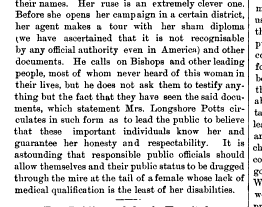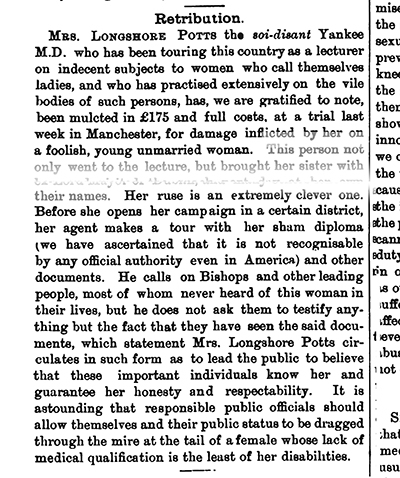From the Collections: Potts, Kettle, Quack?
Lisa Grimm
Prompted by a reference request, I've been looking around to see what other institutions (and, of course, Google Books) might have regarding Dr. Anna Longshore-Potts – a member of the first graduating class (1852) of the Female Medical College of Pennsylvania which would later become the Woman's Medical College of Pennsylvania (and yes, it's 'Woman's' and not 'Women's'). While we had a few items (most of them of a slightly hagiographical bent), I hoped to find a bit more elsewhere to broaden the possible directions of the request.
At first, the online results were quite similar to our own analog holdings – short biographies mentioning her popular lecture tours, her books and her wide travels. Indeed, she seemed to be something along the lines of a medical Oprah – she was even quoted in a A Text-book of the Science and Art of Bread-making, presumably to help boost its sales.
However, once I got into the scholarly journals of the day a very different picture emerged from the male medical establishment – the vast majority of those opinion-makers wanted nothing to do with 'Mrs. Dr. Longshore Potts.' The Journal of the American Medical Association (in 1895) published a note from London whose author did not exactly hold back his (and I think we can very safely say 'his') opinion of Dr. Longshore-Potts and her education:

Journal of the American Medical Association
While it is true that medical education had become much more professionalized from the point at which Dr. Longshore-Potts submitted her thesis ('A Disquisition on Electricity' - one from our collection), by the 1890s the curriculum at WMC was not dissimilar to other highly-regarded medical schools of the time - and was probably quite a bit more stringent than not a few big names. Obviously, that impression was not held by the medical men who edited the Medical Press and Circular in 1899:

Medical Press and Circular
It is, perhaps, a bit unfair to point out that the same edition of JAMA featured an article on 'The Incandescent Light, or Radiant Heat Bath' by no less an authority than Dr. J. H. Kellogg of breakfast cereal fame (complete with photos of the light baths in question) which sang the praises of sitting in a light-bulb-lined box to promote 'protoplasmic activity' - or that the Medical Press argued forcefully regarding the dangers of reading in bed - but somehow, it seems worth mentioning.